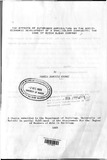| dc.description.abstract | This study is an investigation of the impact of sugarcane contract farming on the socio-economic development of the rural community. This is one area that has been studied considerably, but up to now the exact contribution made by sugarcane contract farming, to the general welfare of the producers has not been established.
An understanding of the effect of contract farming on rural communities is paramount, if these communities are to benefit absolutely from this venture, and if they have to improve their living standard and at the same time contribute effectively to rural development. This study tried to shed some light on this subject by focusing on sugarcane contract farming, in the framework of the operational policies of agribusiness corporations in agriculture vis-a-vis the agricultural and rural development policies, objectives and strategies in Kenya.
Major policies priorities and objectives guiding the operations of agribusiness corporations in the field of agriculture in the Third World were historically traced and examined. Kenya governments policies, objectives and strategies in liason with multinational corporations in the field of agriculture and rural development were partially examined. Contract farming was then analysed with reference to these policies and objectives. Data used in the empirical analysis were obtained from a survey carried out among the sugarcane contract farmers of the Nzoia sugar company.
The sample survey method was applied in the process of data collection. Under this method, both the questionnaire survey and the interview survey were used to afford complementarity. The sampling frame was obtained from a list of outgrower contract farmer of the Nzoia Sugar Company. The sample was obtained using stratified sampling method. Systematic sampling was applied in drawing respondents from each stratum. A total of two hundred respondents were drawn to make the sample for this study. In the process of collecting data questionnaires were administered to 193 respondents. Five respondents were not traced, while two questionnaires were spoilt. Under the interview survey method, twenty respondents were selected and interviewed in more detail.
The raw data collected from the field was coded and fed in the computer. The Computer package SPSS ( the Statistical Package of Social Sciences) program was utilised for the purpose of data analysis.
Two statistical methods namely, descriptive and inferential statistics were used in analysing and presenting the findings. The main descriptive tools used include, the mean, range and percentages. Under inferential statistics, non-parametric statistics were used in the entire analysis. Cross-tabulations were tabulated and statistical measures of association applied to establish the relationship between variables. Measures of association used include, statistical tests of significance such as the Chi-square and measures of strength of association such as the contigency-coefficient among others.
The study found out that, sugarcane contract farming has for many farmers shattered their initial dreams of economic advancement. Relatively a larger number of the contracted farmers have come out worse than they went in. That is, they have lost more than they gained from it. Indeed, the contracted farmers have marginally benefited from sugarcane farming. Perhaps the actual beneficiaries have been the agribusiness firm, the Kenya government and other intermediate parties who continue to reap massive economic benefits at the expense of the contracted farmers whose social and economic state has continued to degenerate.
In terms of socio-economic development sugarcane contract farming has not significantly altered the class situation of the outgrower community. The small farmers have slowly been marginalized by this form of agricultural production. The study observed that sugarcane contract farming in this rural community has not significantly contributed to the intended objectives such as, achieving Kenya's objective of self sufficiency in sugar,improvement of the living standards of the outgrowers, general improvement in agricultural production and productivity, rural infrastrueture, transfer of appropriate capital intensive technology to the food crop sector, creation of more employment opportunities, etc. In general the broad concept of rural developmen t.The study further observes that, contract farming as a mode of production and a strategy for rural development as it stands now, has to be radically overhauled and more realistic and broad objectives set, if it has to bring about any meaningful social change of a long term nature for the rural populace. | |

